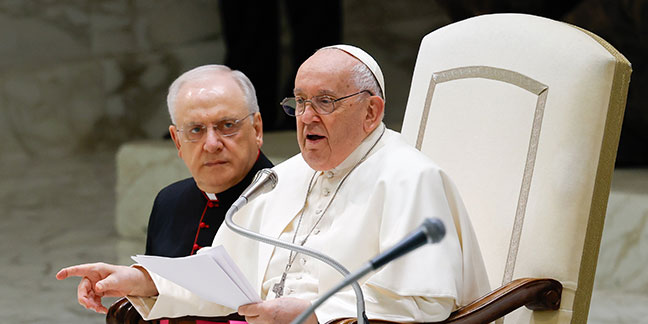 WASHINGTON, D.C. — Synodality is a key theme of Pope Francis' pontificate and its importance to the church's mission can be seen in the American church's response to policy issues including migration, said experts in a Georgetown University panel discussion marking the pontiff's 11th anniversary.
WASHINGTON, D.C. — Synodality is a key theme of Pope Francis' pontificate and its importance to the church's mission can be seen in the American church's response to policy issues including migration, said experts in a Georgetown University panel discussion marking the pontiff's 11th anniversary.
A March 12 panel -- part of Georgetown University's Dahlgren Dialogues and co-sponsored by the school's Office of Mission and Ministry and the Initiative on Catholic Social Thought and Public Life -- examined Pope Francis' call for synodality and its impact on social justice issues.
Synodality is a key element of bringing the Catholic Church's teachings and mission to 21st-century circumstances, panelists said, praising Pope Francis' focus on greater inclusivity and participatory decision-making.
Panelists lauded the efforts made to take a more inclusive approach and listen to the voices of people who are poor or marginalized in society, including migrants and those on death row.
Bishop Daniel E. Flores of Brownsville, Texas, who chairs the U.S. bishops' doctrine committee and coordinates the U.S. bishops' synod process, jokingly rejected his introduction as "head" of that effort. He said that "you kind of want to encourage people to kind of work creatively in their own local communities."
In Brownsville, Bishop Flores said, it has been "moving" for him to watch the Catholic community respond to the needs of migrants "when they started seeing families lined up at bus stations with little children -- without any food -- to get on a bus; and (they) just simply stopped and asked, 'How can I help you?' Which to me is kind of the spontaneous response of a Christian people."
That service, he said, has been "instructive to me about what synodality can be," because "the best ideas don't always come from the chancery."
"The best chancery is the one that listens to what the best ideas are amongst the people of God," he said.
The church's response to migrants at the U.S.-Mexico border is "a responsiveness to a need, a great need of mothers and children and families that are in great distress," Bishop Flores added.
Growing controversy over U.S. immigration policy has placed pressure on the Catholic Church's service to migrants.
Catholic Charities USA, which represents a network of Catholic humanitarian organizations in the U.S., had to respond in 2023 to what it called "disturbing" violent remarks by a social media influencer suggesting Catholic Charities' workers and volunteers should be shot for sheltering migrants.
A state judge March 11 temporarily blocked Texas Attorney General Ken Paxton's subpoena of Annunciation House, citing concerns the state had a "predetermined" motive to shut down the Catholic nonprofit serving migrants. Paxton in February filed suit in an attempt to shut down Annunciation House, accusing it of "human smuggling," in a move denounced by Catholic immigration advocates, including El Paso Bishop Mark J. Seitz.
"Yes, there are challenges," Bishop Flores said. "But the witness of consistency in helping the distressed is a witness ... to a love for Christ in the person."
Krisanne Vaillancourt Murphy, executive director of the Catholic Mobilizing Network, a group that seeks to abolish capital punishment in line with Catholic teaching, said, "Synodality, I think, is us coming to the fore and saying, 'We want to walk our talk; we want to practice what we preach.'"
"We are a people who believe in the common good ... we believe in protecting and defending life from the unborn to the person on death row to the person who's suffering at the end of their life," Vaillancourt Murphy said. "We believe in standing with immigrants, with people who are fleeing from war-torn areas from violence; we believe in caring for creation."
Launched by Pope Francis in October 2021, the first session of the 16th Ordinary General Assembly of the Synod of Bishops, organized on the theme "For a Synodal Church: Communion, Participation, Mission," took place Oct. 4-29, 2023, in Rome.
The synod, also known as the "Synod on Synodality," had its first session summarized in a 41-page report intended to allow the global church to reflect on and give feedback on its contents ahead of the synod's final session scheduled for Oct. 2-27, 2024.
— Kate Scanlon, OSV News


